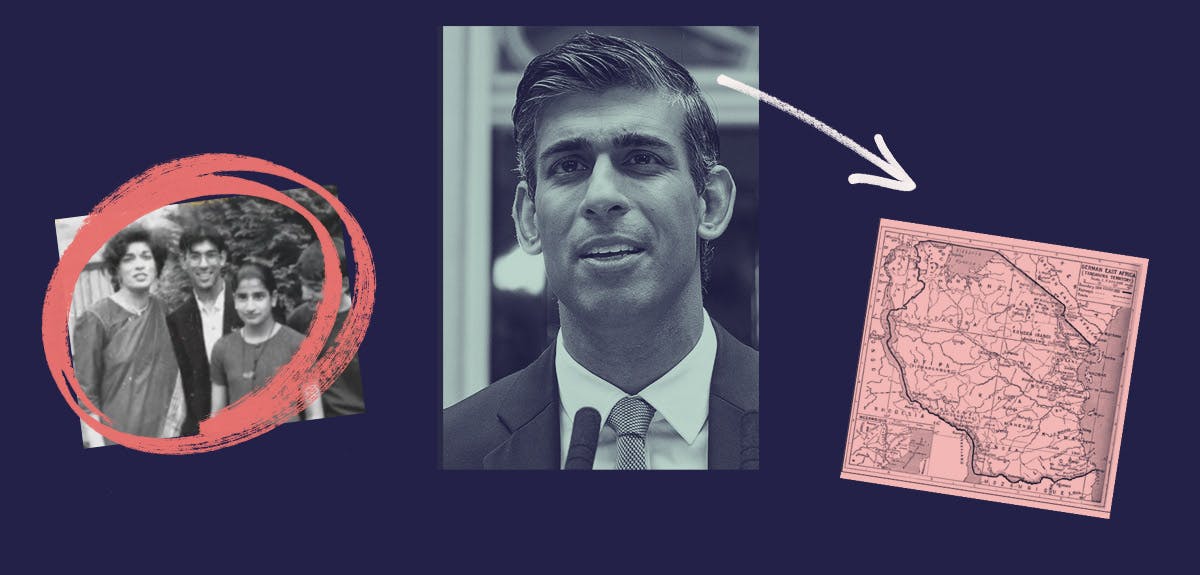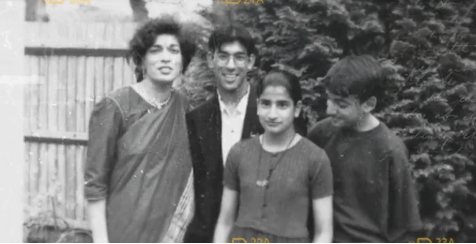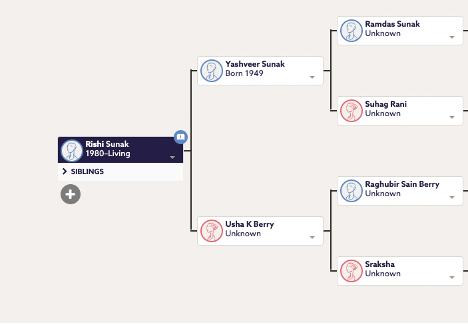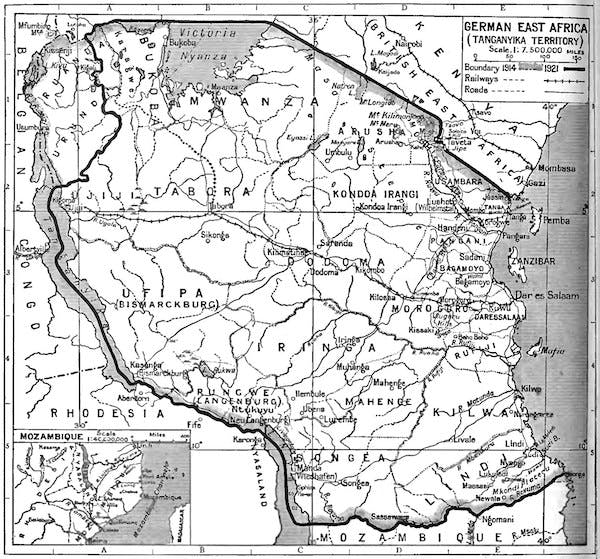November, Tuesday 28th., 2023
IN THE WAKE OF GREEK PRIME MINISTER'S
VISIT TO LONDON YESTERDAY, 27.11. 2023 by M.L.P.
The British Prime Minister: A story of migration, cultural exchange and Yanissarism...
A British national of Indian Punjabi descent and of Tanganyika, now East African Tanzania, eventually following migrating procedures, utilized his rights to the ** "... equality of opportunity" myth inherent in the British Status Quo and now is the British PM.
To put it in the most politically correct way we can say that:
* << Research into his family history reveals an interesting tale of immigration and cultural exchange, set against the backdrop of British colonialism in Asia and Africa.>>
Whereby in the "British colonialism backdrop" term, we may faultlessly encompass those 200-250 (earlier from 1757 till 1947)years of harsh, barbaric, insidious intrusion and rule and exploitation of the excessively abundant wealth of the land and the industriousness and the superior psychic and spiritual culture of the people of the Indian Subcontinent.
We can also unmistakably here add that ***Tanzania became a British Mandate from 1920-1961 after the German occupation/colonization of the country since the 1880's..., thus providing the opportunity to the Crown to milk some more land wealth and commerce riches and free labour, accumulating on itself undeserving power, to the loss of Human Values and to the exandrapodism of the East African inhabitants.
Is it possible that all this heavy in all ways and means and forms and parts cultural legacy, burdening the shoulders of all the branches of a family like the above, leaves unscathed the Individual Human Cell traveling throughout the years?
No, it is not!
Two outcomes are possible. First: Frustrated, aggrieved, disgruntled, rebellious genes will emerge, most likely endangering the family's and the person's livelihood and life.Ominous!
Or, Second: The "Happy Cultural Exchange" ! A story of success, money and glory. Something very similar to the Yanissary**** Issue << (Janissary (Ottoman Turkish: یڭیچری, romanized: yeŋiçeri, [jeniˈtʃeɾi], lit. 'new soldier') with which both the Byzantine-Hellenic motherland from the side of the attacked and the Ottoman Empire, from the side of the occupant power, were and are very well acquainted with.
Yanissaries were infamous for the cruelty, brutality, the willful infliction of pain on the others, even if the others happened to be their original physical family members, before their being abducted by the Turks.
<<they became one of the ruling classes of the Ottoman Empire,
rivalling the Turkish aristocracy. The brightest of the Janissaries were
sent to the palace institution, Enderun. Through a system of meritocracy, the Janissaries held enormous power, stopping all efforts to reform the military>>
Herebelow you may see some tall, thin, elegant, handsome Yanissary of past and present times with their corresponding weapons.

 The current Prime Minister of the United Kingdom had all the necessary support and instruments to set on action, while leading the country to the new era into which Humanity is entering.The eons-old compromised, corrupt, rusty Factors and Agents and Bodies and Policies are decaying towards their final curtain.
The current Prime Minister of the United Kingdom had all the necessary support and instruments to set on action, while leading the country to the new era into which Humanity is entering.The eons-old compromised, corrupt, rusty Factors and Agents and Bodies and Policies are decaying towards their final curtain.
A Global social awakening, alternative technologies-media-concepts-science-grassroots incessantly pop up, remarkedly sound and clear. A new United Kingdom with bright future could be bravely borne based on Human Values, via which Humanity flourishes. Sathya-Dharma-Shanti-Prema-Ahimsa
[सत्य- ९., धर्मः, शान्ति, प्रेमा, अहिंसा ], could be cultivated as the new national and international administrative targets and they could be slowly and intelligently lawfully approached to the benefit of all, also building a good name for the Initiator/Innovator PM.
Had only this Yanissari abandoned the typical fearful, complexed stubbornness of stopping all efforts to reform, to evolution, to progress...
A wholesome discussion with the Greek PM., about all critical matters of international politics and economics would be valued and a fresh glance of honesty against crime, theft, exploitism of the past -not to mention the present- would be globally and dearly appreciated.
Unfortunately for our extremely wealthy, ambitious but alas, disproportionately insightful and poorly discerning Yanissary, the situation turned unfriendly to him.
The only positive outcome of the whole incident is his dearest colleague and friend 's
A story of migration and cultural exchange: Rishi Sunak's family tree
4-5 minute read
By Daisy Goddard

With a heritage that spans from India to East Africa, this Conservative politician’s family has a rich and interesting history.
We’re all familiar with PM Liz Truss’ successor, Rishi Sunak. But how much do you know about the new Prime Minister’s roots?
Research into Rishi’s family history reveals an interesting tale of immigration and cultural exchange, set against the backdrop of British colonialism in Asia and Africa.
Rishi attended the prestigious boarding school Winchester College, whose former students include aristocrats, ambassadors, and even Nobel prize winners.
While studying Philosophy, Politics, and Economics at Lincoln College, Oxford, Rishi Sunak met his wife, Akshata Murthy, who is the daughter of Indian billionaire N. R. Narayana Murthy. Rishi and his wife have an estimated joint net worth of £730 million, making them the 222nd richest couple in the UK. They have two children.

A young Rishi with his mother, Usha, and his siblings.
Rishi’s mother Usha is a pharmacist. She married Rishi’s father Yashvir in 1977, in Leicester. Yashvir also has a medical background; he worked as a GP after studying medicine at the University of Liverpool. The couple moved to Southampton in the late 1970s, where Rishi and his siblings were born.

Rishi Sunak's family tree.
Rishi is a British national, and his parents Usha and Yashvir are of Indian Punjabi descent. Neither was born in India, however. Their parents were among the hundreds of thousands who migrated to East Africa in the 1930s and 40s.
With some digging, we uncovered compelling stories on both sides of Rishi Sunak’s family tree.
From the Punjab to Leicester
Rishi’s mother was born to parents Sraksha and Raghubir Sain Berry in Tanganyika, a former British territory located in present-day Tanzania.
Raghubir (Rishi’s maternal grandfather) was born in the Punjab but moved to Tanganyika to work as a railway engineer aged 22. After migrating, he married the Tanganyika-born Sraksha in an arranged marriage. She was aged 16.

Tanganyika Territory in 1922, Encyclopaedia Britannica.
There’s a long history of Indian migration to Tanzania, spanning back to the Gujarati traders of the 13th century. The territory was a British colony between 1916 and 1961.
Many Indian workers like Raghubir were employed by Tanzania’s colonial administration. This was because India was also ruled by Britain; the period of the British Raj spanned from 1858 to 1947.
~~~~~~~~~~~~~~~~~~~~~~~~~~~~~~~~~~~~~~~
*Research into Rishi’s family history reveals an interesting tale of immigration and cultural exchange, set against the backdrop of British colonialism in Asia and Africa.
Rishi is a British national, and his parents Usha and Yashvir are of Indian Punjabi descent. Neither was born in India, however. Their parents were among the hundreds of thousands who migrated to East Africa in the 1930s and 40s.
Rishi’s
mother was born to parents Sraksha and Raghubir Sain Berry in
Tanganyika, a former British territory located in present-day Tanzania.
There’s a long history of Indian migration to Tanzania, spanning back to the Gujarati traders of the 13th century. The territory was a British colony between 1916 and 1961.
The usual tactics (tactics:
[noun, plural in form but singular or plural in construction] the
science and art of disposing and maneuvering forces in combat. the art
or skill of employing available means to accomplish an end.) of the British myth of "equality of opportunity":
* *<<...Queen Victoria’s 1858 promise of racial equality of opportunity
in the selection of civil servants for the government of India had
theoretically thrown the ICS open to qualified Indians, but examinations
for the services were given only in Britain and only to male applicants
between the ages of 17 and 22 (in 1878 the maximum age was further
reduced to 19) who could stay in the saddle over a rigorous series of
hurdles. It is hardly surprising, therefore, that by 1869 only one
Indian candidate had managed to clear those obstacles to win a coveted
admission to the ICS. British royal promises of equality were thus
subverted in actual implementation by jealous, fearful bureaucrats posted “on the spot.”
****Janissaries began as elite corps made up through the devşirme system of child levy enslavement, by which Christian Albanians, Bulgarians, Croats, Greeks, Romanians, Serbs and Ukrainians were taken, levied, subjected to forced circumcision and conversion to Islam, and incorporated into the Ottoman army.[6] They became famed for internal cohesion cemented by strict discipline and order. Unlike typical slaves, they were paid regular salaries. Forbidden to marry before the age of 40 or engage in trade, their complete loyalty to the Sultan was expected.[7] By the seventeenth century, due to a dramatic increase in the size of the Ottoman standing army, the corps' initially strict recruitment policy was relaxed. Civilians bought their way into it in order to benefit from the improved socioeconomic status it conferred upon them. Consequently, the corps gradually lost its military character, undergoing a process that has been described as "civilianization".[8]
the taking (enslaving) of non-Muslim boys,[13] notably Anatolian and Balkan Christians;>>
<<The Janissaries were kapıkulları (sing. kapıkulu), "door servants" or "slaves of the Porte", neither freemen nor ordinary slaves (köle).[16] They were subjected to strict discipline, but were paid salaries and pensions upon retirement and formed their own distinctive social class.[17] As such, they became one of the ruling classes of the Ottoman Empire, rivalling the Turkish aristocracy. The brightest of the Janissaries were sent to the palace institution, Enderun. Through a system of meritocracy, the Janissaries held enormous power, stopping all efforts to reform the military.[12] >>